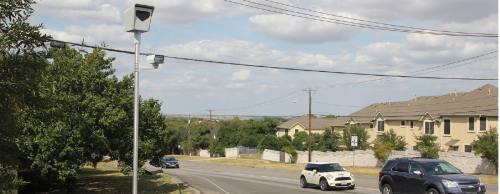Round Rock City Council unanimously voted to end its contract with Redflex Traffic Systems, the company that operates red-light cameras in the city, on Oct. 8. The program will be canceled effective Dec. 31.
Council members said the program was not deterring drivers who run red lights in the city, which was the intention of the program.
“I was one of the real proponents when we did this. I think we had a problem and still have a problem,” Mayor Alan McGraw said. “To me, [the red-light camera program] is not doing what it’s intended to do. The goal has been to correct behavior.”
City Council started the program in 2011. It came under scrutiny in September after City Council saw a presentation from Round Rock Police Chief Alan Banks that made members question the program’s effectiveness.
Council Member Kris Whitfield said the intention of the program was never for the city to collect money from it.
“We knew we wouldn’t be getting any money or much money [from red-light cameras],” Whitfield said. “The statistics have shown it’s not making a difference.”
According to data from the department, the percentage of traffic violators remained consistent from November 2012 to July 2015—ranging from about 0.03 percent to 0.04 percent of drivers receiving a citation.
The city did see a financial net gain from the program: $176,624.57, according to city documents. The program’s net revenue totaled $353,249.13, but the city had to give half of that to the state.
Transportation Director Gary Hudder said at a Sept. 8 City Council workshop the funds his department received from the program have to be spent on specific projects such as intersection safety improvements. He said most projects along those lines cost about $300,000 to $400,000.
“We’ve been hard-pressed to spend the dollars in what I would consider a significant benefit,” Hudder said.
Banks said at the Sept. 8 meeting the current red-light camera ticketing system allows motorists who receive a ticket to not pay the fine since it is not a criminal offense when received from a red-light camera. Banks said for the system to be effective an enforcement mechanism needs to be in place.
“We have 14,000 unpaid violations right now,” Banks said. “We have 14,000 people thumbing their nose at the city of Round Rock.”
McGraw said with the current enforcement mechanism, motorists who disregard red lights are also prone to disregard a bill they are not obligated to pay. Banks said most of the citations go to vehicles registered outside the city.
Texas law does allow for cities and counties to opt into the Scofflaw Centralized Protections program, which would prevent motorists from registering their vehicle if they have an outstanding ticket received from a red-light camera. Round Rock is not a part of the program. Council Member Craig Morgan said the city could not join the program unless the county did so.
Redflex representative Andrea Czajkowski said other cities in the state have had success with the scofflaw program and encouraged council members to keep the program active.
Banks said moving forward without the red-light cameras, the department will focus on targeted enforcement of intersections. He said the department is also making videos and public service announcements about the dangers and consequences of running red lights.





